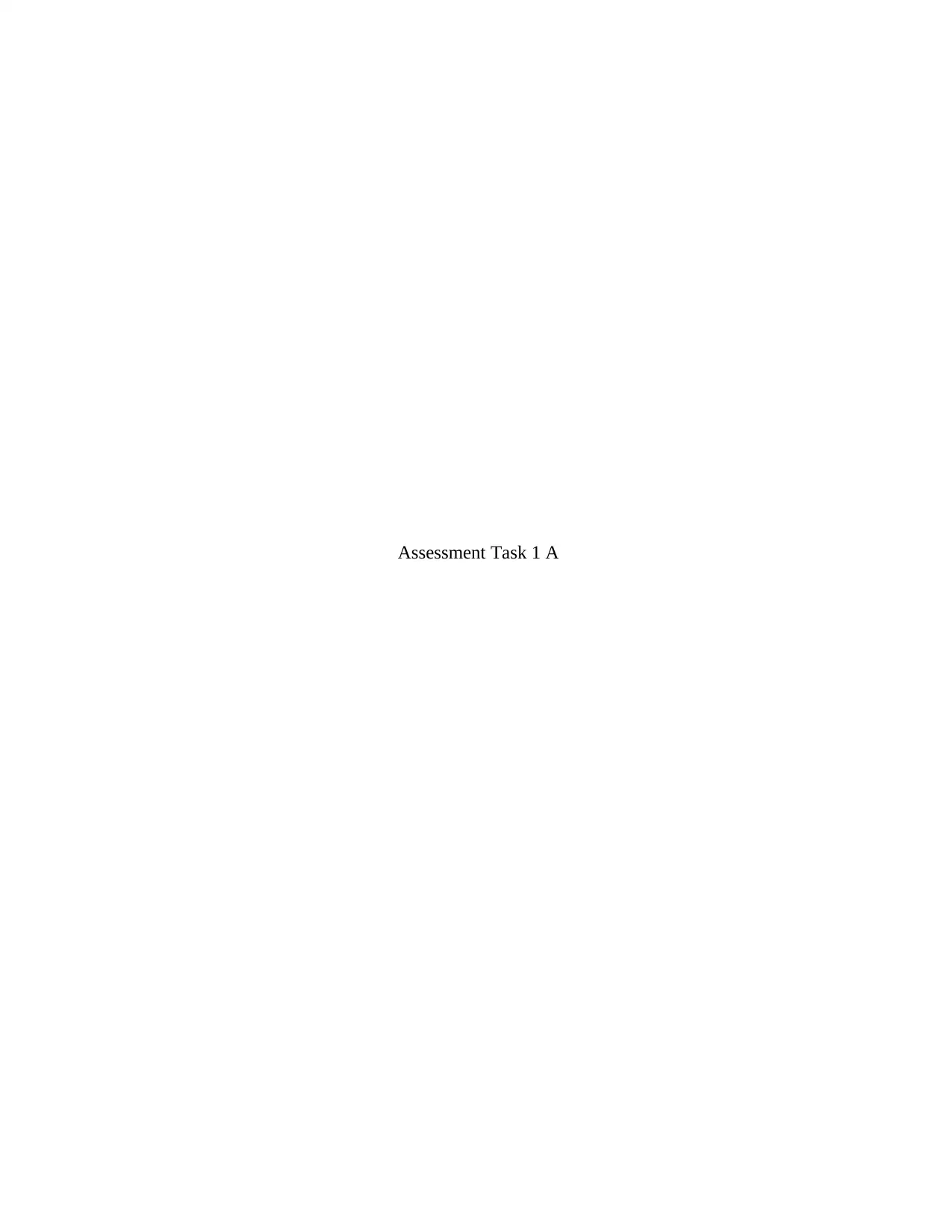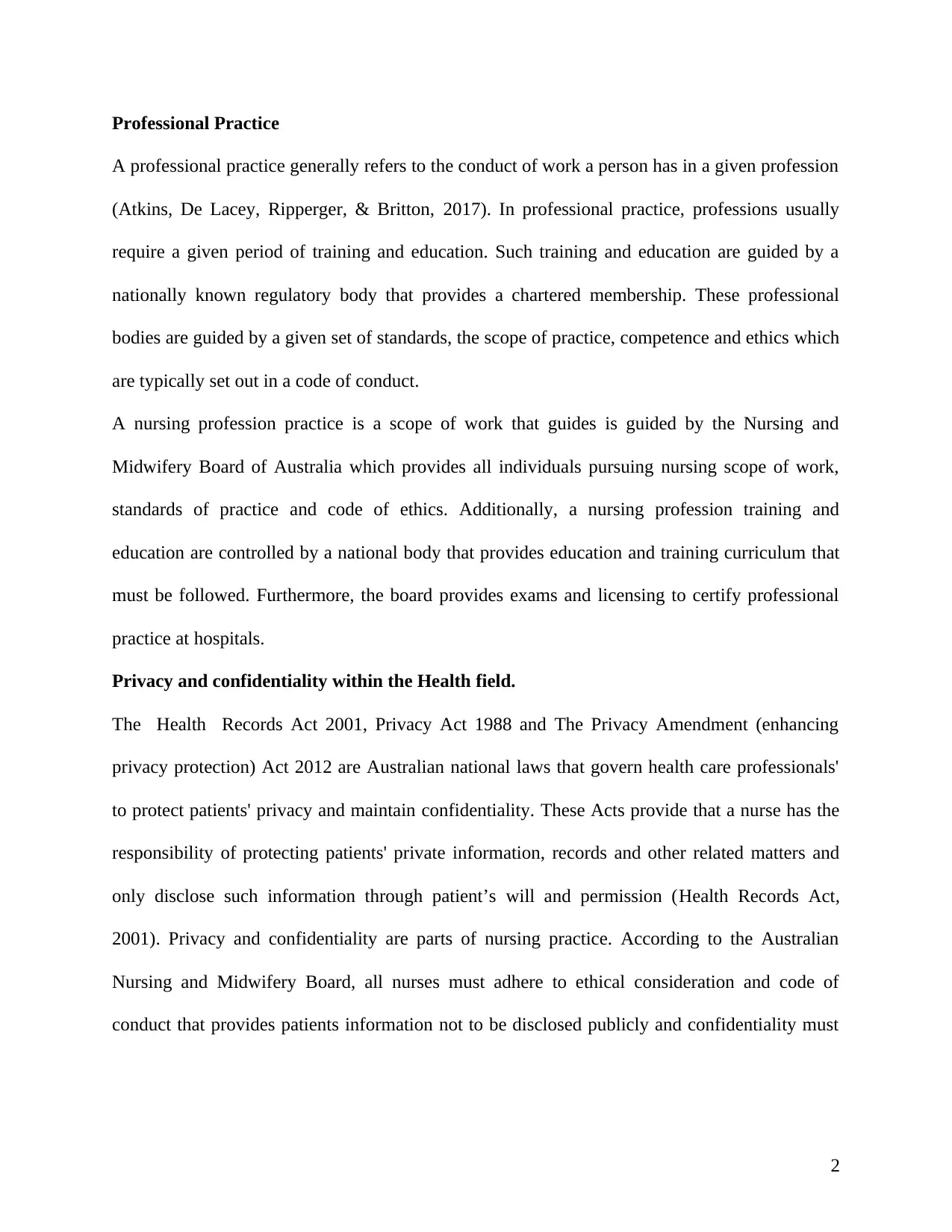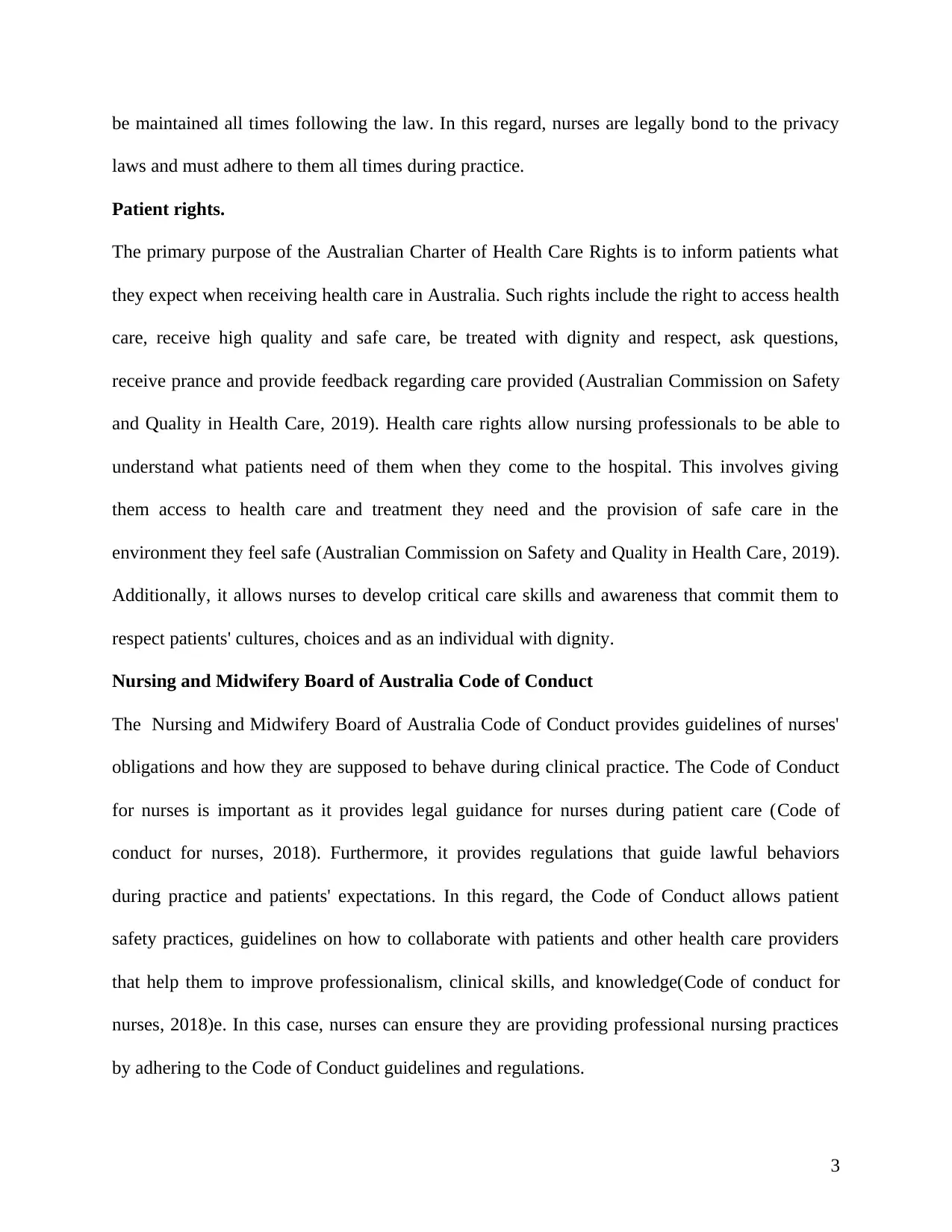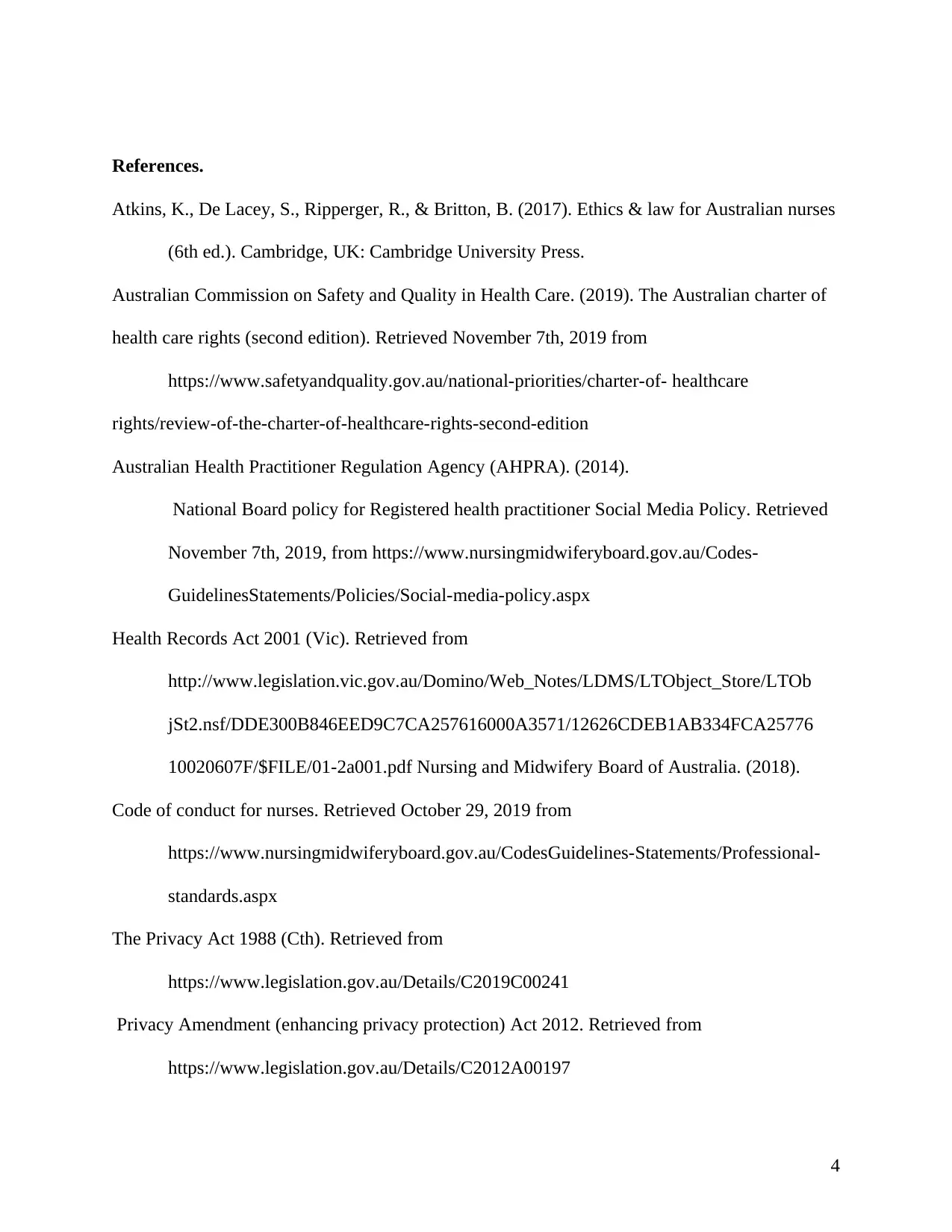NURBN 1001 Assessment 1A: Professional Nursing Practice Report
VerifiedAdded on 2022/08/22
|5
|846
|25
Report
AI Summary
This report analyzes the core components of professional nursing practice, as defined by the Nursing and Midwifery Board of Australia. It examines the significance of professional conduct, emphasizing the importance of training, education, and adherence to regulatory standards. The report delves into critical aspects such as patient privacy, confidentiality, and the legal frameworks that govern them, including the Health Records Act 2001, Privacy Act 1988, and the Privacy Amendment Act 2012. It highlights the importance of patient rights as outlined in the Australian Charter of Health Care Rights, and the role of the Code of Conduct in guiding nurses' behavior and ensuring patient safety. The report references key documents and guidelines, providing a comprehensive understanding of the responsibilities and expectations of nurses within the Australian healthcare system, ensuring professional nursing practices.

Assessment Task 1 A
Paraphrase This Document
Need a fresh take? Get an instant paraphrase of this document with our AI Paraphraser

Professional Practice
A professional practice generally refers to the conduct of work a person has in a given profession
(Atkins, De Lacey, Ripperger, & Britton, 2017). In professional practice, professions usually
require a given period of training and education. Such training and education are guided by a
nationally known regulatory body that provides a chartered membership. These professional
bodies are guided by a given set of standards, the scope of practice, competence and ethics which
are typically set out in a code of conduct.
A nursing profession practice is a scope of work that guides is guided by the Nursing and
Midwifery Board of Australia which provides all individuals pursuing nursing scope of work,
standards of practice and code of ethics. Additionally, a nursing profession training and
education are controlled by a national body that provides education and training curriculum that
must be followed. Furthermore, the board provides exams and licensing to certify professional
practice at hospitals.
Privacy and confidentiality within the Health field.
The Health Records Act 2001, Privacy Act 1988 and The Privacy Amendment (enhancing
privacy protection) Act 2012 are Australian national laws that govern health care professionals'
to protect patients' privacy and maintain confidentiality. These Acts provide that a nurse has the
responsibility of protecting patients' private information, records and other related matters and
only disclose such information through patient’s will and permission (Health Records Act,
2001). Privacy and confidentiality are parts of nursing practice. According to the Australian
Nursing and Midwifery Board, all nurses must adhere to ethical consideration and code of
conduct that provides patients information not to be disclosed publicly and confidentiality must
2
A professional practice generally refers to the conduct of work a person has in a given profession
(Atkins, De Lacey, Ripperger, & Britton, 2017). In professional practice, professions usually
require a given period of training and education. Such training and education are guided by a
nationally known regulatory body that provides a chartered membership. These professional
bodies are guided by a given set of standards, the scope of practice, competence and ethics which
are typically set out in a code of conduct.
A nursing profession practice is a scope of work that guides is guided by the Nursing and
Midwifery Board of Australia which provides all individuals pursuing nursing scope of work,
standards of practice and code of ethics. Additionally, a nursing profession training and
education are controlled by a national body that provides education and training curriculum that
must be followed. Furthermore, the board provides exams and licensing to certify professional
practice at hospitals.
Privacy and confidentiality within the Health field.
The Health Records Act 2001, Privacy Act 1988 and The Privacy Amendment (enhancing
privacy protection) Act 2012 are Australian national laws that govern health care professionals'
to protect patients' privacy and maintain confidentiality. These Acts provide that a nurse has the
responsibility of protecting patients' private information, records and other related matters and
only disclose such information through patient’s will and permission (Health Records Act,
2001). Privacy and confidentiality are parts of nursing practice. According to the Australian
Nursing and Midwifery Board, all nurses must adhere to ethical consideration and code of
conduct that provides patients information not to be disclosed publicly and confidentiality must
2

be maintained all times following the law. In this regard, nurses are legally bond to the privacy
laws and must adhere to them all times during practice.
Patient rights.
The primary purpose of the Australian Charter of Health Care Rights is to inform patients what
they expect when receiving health care in Australia. Such rights include the right to access health
care, receive high quality and safe care, be treated with dignity and respect, ask questions,
receive prance and provide feedback regarding care provided (Australian Commission on Safety
and Quality in Health Care, 2019). Health care rights allow nursing professionals to be able to
understand what patients need of them when they come to the hospital. This involves giving
them access to health care and treatment they need and the provision of safe care in the
environment they feel safe (Australian Commission on Safety and Quality in Health Care, 2019).
Additionally, it allows nurses to develop critical care skills and awareness that commit them to
respect patients' cultures, choices and as an individual with dignity.
Nursing and Midwifery Board of Australia Code of Conduct
The Nursing and Midwifery Board of Australia Code of Conduct provides guidelines of nurses'
obligations and how they are supposed to behave during clinical practice. The Code of Conduct
for nurses is important as it provides legal guidance for nurses during patient care (Code of
conduct for nurses, 2018). Furthermore, it provides regulations that guide lawful behaviors
during practice and patients' expectations. In this regard, the Code of Conduct allows patient
safety practices, guidelines on how to collaborate with patients and other health care providers
that help them to improve professionalism, clinical skills, and knowledge(Code of conduct for
nurses, 2018)e. In this case, nurses can ensure they are providing professional nursing practices
by adhering to the Code of Conduct guidelines and regulations.
3
laws and must adhere to them all times during practice.
Patient rights.
The primary purpose of the Australian Charter of Health Care Rights is to inform patients what
they expect when receiving health care in Australia. Such rights include the right to access health
care, receive high quality and safe care, be treated with dignity and respect, ask questions,
receive prance and provide feedback regarding care provided (Australian Commission on Safety
and Quality in Health Care, 2019). Health care rights allow nursing professionals to be able to
understand what patients need of them when they come to the hospital. This involves giving
them access to health care and treatment they need and the provision of safe care in the
environment they feel safe (Australian Commission on Safety and Quality in Health Care, 2019).
Additionally, it allows nurses to develop critical care skills and awareness that commit them to
respect patients' cultures, choices and as an individual with dignity.
Nursing and Midwifery Board of Australia Code of Conduct
The Nursing and Midwifery Board of Australia Code of Conduct provides guidelines of nurses'
obligations and how they are supposed to behave during clinical practice. The Code of Conduct
for nurses is important as it provides legal guidance for nurses during patient care (Code of
conduct for nurses, 2018). Furthermore, it provides regulations that guide lawful behaviors
during practice and patients' expectations. In this regard, the Code of Conduct allows patient
safety practices, guidelines on how to collaborate with patients and other health care providers
that help them to improve professionalism, clinical skills, and knowledge(Code of conduct for
nurses, 2018)e. In this case, nurses can ensure they are providing professional nursing practices
by adhering to the Code of Conduct guidelines and regulations.
3
⊘ This is a preview!⊘
Do you want full access?
Subscribe today to unlock all pages.

Trusted by 1+ million students worldwide

References.
Atkins, K., De Lacey, S., Ripperger, R., & Britton, B. (2017). Ethics & law for Australian nurses
(6th ed.). Cambridge, UK: Cambridge University Press.
Australian Commission on Safety and Quality in Health Care. (2019). The Australian charter of
health care rights (second edition). Retrieved November 7th, 2019 from
https://www.safetyandquality.gov.au/national-priorities/charter-of- healthcare
rights/review-of-the-charter-of-healthcare-rights-second-edition
Australian Health Practitioner Regulation Agency (AHPRA). (2014).
National Board policy for Registered health practitioner Social Media Policy. Retrieved
November 7th, 2019, from https://www.nursingmidwiferyboard.gov.au/Codes-
GuidelinesStatements/Policies/Social-media-policy.aspx
Health Records Act 2001 (Vic). Retrieved from
http://www.legislation.vic.gov.au/Domino/Web_Notes/LDMS/LTObject_Store/LTOb
jSt2.nsf/DDE300B846EED9C7CA257616000A3571/12626CDEB1AB334FCA25776
10020607F/$FILE/01-2a001.pdf Nursing and Midwifery Board of Australia. (2018).
Code of conduct for nurses. Retrieved October 29, 2019 from
https://www.nursingmidwiferyboard.gov.au/CodesGuidelines-Statements/Professional-
standards.aspx
The Privacy Act 1988 (Cth). Retrieved from
https://www.legislation.gov.au/Details/C2019C00241
Privacy Amendment (enhancing privacy protection) Act 2012. Retrieved from
https://www.legislation.gov.au/Details/C2012A00197
4
Atkins, K., De Lacey, S., Ripperger, R., & Britton, B. (2017). Ethics & law for Australian nurses
(6th ed.). Cambridge, UK: Cambridge University Press.
Australian Commission on Safety and Quality in Health Care. (2019). The Australian charter of
health care rights (second edition). Retrieved November 7th, 2019 from
https://www.safetyandquality.gov.au/national-priorities/charter-of- healthcare
rights/review-of-the-charter-of-healthcare-rights-second-edition
Australian Health Practitioner Regulation Agency (AHPRA). (2014).
National Board policy for Registered health practitioner Social Media Policy. Retrieved
November 7th, 2019, from https://www.nursingmidwiferyboard.gov.au/Codes-
GuidelinesStatements/Policies/Social-media-policy.aspx
Health Records Act 2001 (Vic). Retrieved from
http://www.legislation.vic.gov.au/Domino/Web_Notes/LDMS/LTObject_Store/LTOb
jSt2.nsf/DDE300B846EED9C7CA257616000A3571/12626CDEB1AB334FCA25776
10020607F/$FILE/01-2a001.pdf Nursing and Midwifery Board of Australia. (2018).
Code of conduct for nurses. Retrieved October 29, 2019 from
https://www.nursingmidwiferyboard.gov.au/CodesGuidelines-Statements/Professional-
standards.aspx
The Privacy Act 1988 (Cth). Retrieved from
https://www.legislation.gov.au/Details/C2019C00241
Privacy Amendment (enhancing privacy protection) Act 2012. Retrieved from
https://www.legislation.gov.au/Details/C2012A00197
4
Paraphrase This Document
Need a fresh take? Get an instant paraphrase of this document with our AI Paraphraser

5
1 out of 5
Related Documents
Your All-in-One AI-Powered Toolkit for Academic Success.
+13062052269
info@desklib.com
Available 24*7 on WhatsApp / Email
![[object Object]](/_next/static/media/star-bottom.7253800d.svg)
Unlock your academic potential
Copyright © 2020–2026 A2Z Services. All Rights Reserved. Developed and managed by ZUCOL.





